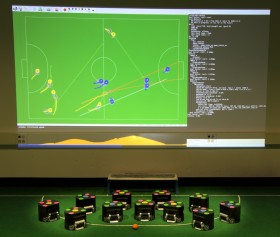
RI Seminar
September

3:30 pm to 4:30 pm
Event Location: NSH 1305
Bio: The CMDragons research team is advised by Manuela Veloso, Herbert A. Simon Professor in CSD and courtesy in RI. The other members of the team are Joydeep Biswas (team leader, RI PhD student), Juan Pablo Mendoza (RI PhD student), Danny Zhu (CSD PhD student), Benjamin Choi (CSD junior), and Alex Etling (CSD senior), Steve Klee (CSD sophomore). We thank Mike Licitra for having provided the new electronic boards for the robots and Joydeep Biswas for having built, polished, calibrated, and maintained each one and all the robots, with the help of mechanical engineer Tom Charley.
Abstract: We first briefly introduce the RoboCup robot soccer Small-Size League (SSL), defining the technical challenges of the setup and competition. We then present our CMDragons SSL team, which strongly performed at the recent RoboCup’13 competition, placing second out of twenty teams, after a prolonged final match ending in penalty shoot-outs. CMDragons’13 is a significant step beyond our previous teams, as we describe, in terms of hardware, low-level skills, and “AI,” i.e., multi-robot planning and execution. For the first time, we have 12 robots, which we built based on the proven successful mechanical robot designs from CMDragons’06, coupled now with new electronics control boards. We were able to practice complete games of two teams of real robots and in simulation, arbitrated by our newly developed automated referee. We explain the CMDragons’ new low-level skills, including a dynamic ball interception algorithm using near-time-optimal control of holonomic robots, crucial to scoring in a fast-paced game of soccer. We then present in detail the multi-robot planning and execution algorithms in the challenging SSL adversarial environment. We introduce a pass-ahead behavior, as well as a new dynamic two-stage planner, Coerce and Attack, which explicitly considers opponent defense to hypothetical attack patterns. The “Coerce” stage generates a coerce attack formation to coerce the opponent robots into corresponding defense positions. The “Attack” stage modifies the coerce attack pattern in a fluid manner to exploit openings in the defense using pass-ahead to attempt to score. We conclude the talk with a discussion of our planned future work. The talk will be illustrated with multiple videos of plays in our lab and in games.
Presented by Team Leader, Joydeep Biswas, Manuela Veloso, Juan Pablo Mendoza, Danny Zhu, Benjamin Choi, Alex Etling, Steven Klee, and special thanks to Michael Licitra